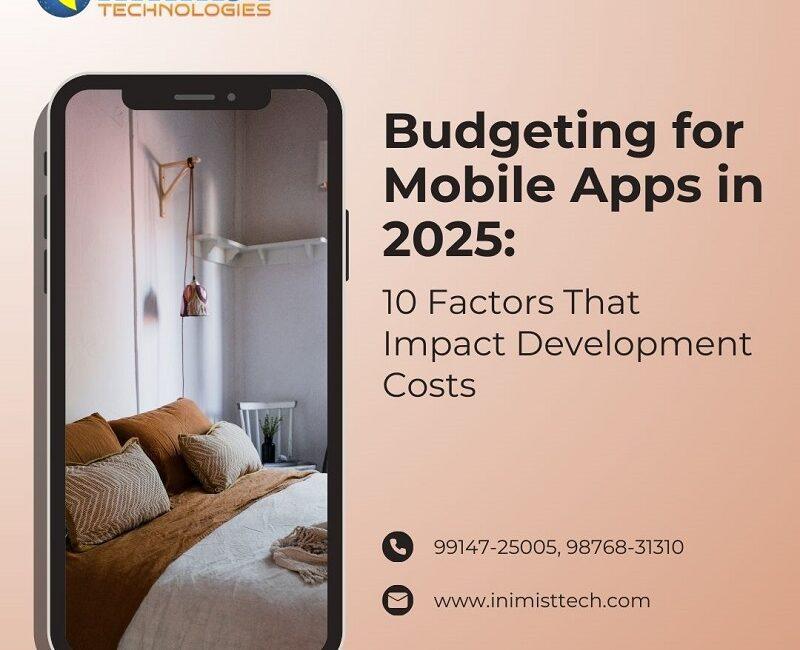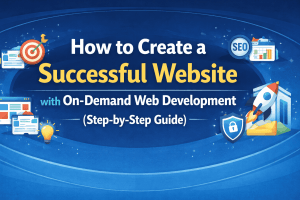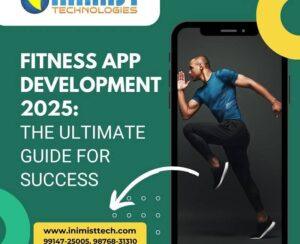
Inimist Tech | September 5, 2025
Budgeting for Mobile Apps in 2025: 10 Factors That Impact Development Costs
In 2025, mobile apps will have become a core part of doing business. Whether it’s for customer engagement, brand building, or direct revenue, mobile apps are crucial. But one of the most common questions companies ask is
“How much does it cost to develop an app?”
The answer? It depends.
Mobile app development costs can range from $10,000 to over $500,000, depending on various factors. Understanding these variables helps you set a realistic budget, avoid financial surprises, and make smarter decisions.

Here are 10 key factors that impact mobile app development costs in 2025:
1. App Complexity and Features
The complexity of your app is the #1 cost driver.
- Basic Apps: Single-function apps (such as calculators) typically cost between $10,000 and $30,000.
- Mid-Level Apps: Apps with user profiles, real-time chat, payment integration, etc., may cost $40,000 – $150,000.
- Complex Apps: Apps with AI, AR/VR, blockchain, or video streaming can exceed $200,000.
More features = more development time = higher cost.
2. Choice of Platform: iOS, Android, or Both?
Choosing between iOS, Android, or cross-platform development affects your budget.
- iOS-only: Slightly cheaper (fewer device variations).
- Android-only: Slightly more expensive (more device support needed).
- Cross-Platform (Flutter/React Native): 30-40% faster development and lower cost compared to separate native apps.
If your budget is tight, cross-platform is usually the better choice in 2025
3. UI/UX Design Complexity
User experience is critical. Good design leads to higher retention but costs more.
- Basic Design: $3,000 – $10,000
- Custom Design & Animations: $15,000 – $50,000+
In 2025, users expect smooth micro-interactions, clean interfaces, and intuitive navigation.
4. Backend Infrastructure & APIs
The backend handles user data, payments, and business logic.
- Simple apps: Might not need a backend.
- Data-driven apps: Require databases, cloud storage, and APIs.
Costs range from $5,000 to $100,000+, depending on the complexity.
5. Development Team Location
Where your development team is located impacts hourly rates.
| Region | Hourly Rate |
|---|---|
| USA/Canada | $80 – $150 |
| Western Europe | $70 – $120 |
| Eastern Europe | $40 – $70 |
| India/Asia | $20 – $50 |
Outsourcing can save costs but may require careful management.
6. App Security & Compliance
With strict privacy regulations in 2025, security is essential.
- GDPR, HIPAA, and PCI-DSS compliance add to the cost.
- Features like biometric login, encryption, and fraud detection require extra development time.
Security is not optional; it’s a must-have.
7. Maintenance & Updates
Launching the app is just the start. Regular updates are required for:
- Bug fixes
- New features
- OS compatibility
- Security patches
Expect to spend 15-20% of the initial development cost annually on maintenance.
8. Marketing & App Store Optimization (ASO)
Building the app is half the battle. Getting users to download it is the other half.
- ASO: $1,000 – $5,000
- Paid Ads: $10,000+
- Influencer Marketing & PR: Variable costs
A smart marketing budget is essential for success.
9. Use of Emerging Technologies
Innovative features make apps stand out, but increase costs.
- AI/ML: Chatbots, recommendation engines
- AR/VR: Interactive shopping or gaming
- Blockchain: Secure transactions or NFTs
- IoT Integration: Smart device control
Specialized tech requires skilled developers, adding to the budget.
10. Legal & Licensing Costs
Don’t forget legal expenses:
- Software licenses (APIs, SDKs)
- Developer account fees (Apple: $99/year, Google Play: $25 one-time)
- Contracts & intellectual property protection
Legal compliance protects you from future risks.
App development is a long-term investment. Building a successful app in 2025 requires thoughtful budgeting for development, design, marketing, maintenance, and legal needs.
Summary of Key Cost Factors:
- App Complexity
- Platform Choice
- UI/UX Design
- Backend Infrastructure
- Team Location
- Security & Compliance
- Maintenance
- Marketing
- Emerging Technologies
- Legal & Licensing
Pro Tip: Start with a Minimum Viable Product (MVP) to test your idea before committing to full development.
By understanding these 10 factors, you can plan your budget more effectively and set your app up for long-term success.
Latest Posts
-
What Makes Modern Online Casinos So Popular
January 30, 2026 -

-

Fitness App Development in 2025: The Ultimate Guide for Success
November 5, 2025 -

IT Companies in Mohali The Impact of Mobile Apps
July 8, 2025 -

Mastering Mobile App Development in 2025
June 8, 2025
